I’ve had the pleasure of learning about various cat breeds and keeping some of them. However, the Sphynx cat breed never fails to amaze me with its unique charm. Known for their hairless appearance, these felines are much more than just an exotic breed.
What sets Sphynx cats apart from other cat breeds is their hypoallergenic qualities. Those who love cats but are allergic to them can finally own a cat without sneezing or itching. Sphynx cats are not only hypoallergenic but also affectionate and intelligent, making them great companions for any household.
Key Takeaways:
- Sphynx cats are a unique and exotic breed that have a hairless appearance.
- They are hypoallergenic, making them a suitable choice for individuals with allergies.
- Sphynx cats are loving and intelligent, making them great companions.
The Origins of the Sphynx Cat Breed
Welcome back to our exploration of the fascinating Sphynx cat breed! In this section, let’s take a closer look at the origins of this exotic and unique cat breed.
The Sphynx cat is a relatively new breed, first appearing in Canada in 1966. The breed’s hairlessness is the result of a natural genetic mutation that arose in a domestic cat breed in the mid-20th century. Breeders then began intentionally breeding hairless cats and subsequently crossbreeding them with other breeds, including American Shorthairs and Siamese, to create the Sphynx we know today.
Despite their unusual appearance, Sphynx cats have quickly gained popularity among cat enthusiasts, especially due to their distinctive affectionate and sociable personality traits.
In terms of appearance, Sphynx cats have a unique look that sets them apart from other cat breeds. Their skin appears to be wrinkled and they do have some hair, typically on their nose, ears, tail, and toes. This hair is usually very sparse and fine, and often described as feeling like a soft peach or suede.
The Sphynx cat breed has been recognized by various cat fancier associations, including The International Cat Association and the Cat Fanciers’ Association, which officially recognized the breed in 2002.
In conclusion, the Sphynx cat is a relatively new and unique exotic breed that continues to captivate the hearts of cat lovers worldwide. Their hairlessness is the result of a natural genetic mutation that breeders have carefully cultivated over time, resulting in one of the most fascinating cat breeds around.
The Personality and Temperament of Sphynx Cats
When it comes to personality, Sphynx cats are in a league of their own. These loving and social creatures thrive on human attention and are known for their intelligence and playful nature.
One of the most significant advantages of owning a Sphynx cat is the level of interaction and engagement they offer. They are highly social animals and love to be around their human companions, often following them around the house as they go about their day. They are also great with kids and can make fantastic family pets.
Thanks to their high level of intelligence, Sphynx cats are quick learners and can adapt well to different environments. They enjoy being challenged and are responsive to training, making them a great choice for owners who want an engaging and interactive pet.
While they are generally very affectionate animals, Sphynx cats can be highly sensitive to their owners’ moods and emotions. They are known to be very empathetic creatures and have been known to cheer up their humans when they’re feeling down.
Overall, Sphynx cats are highly social, intelligent, and affectionate animals, making them an excellent choice for anyone who wants an interactive and engaging pet.
Sphynx cats are highly social, intelligent, and affectionate animals, making them an excellent choice for anyone who wants an interactive and engaging pet.
Health Considerations for Sphynx Cats
As a hairless breed, Sphynx cats require special attention to maintain their unique appearance and overall health. Owners must be aware of the specific care needs that come with owning a hairless cat breed.
Skin Care
Sphynx cats have sensitive skin that requires regular cleaning to avoid any irritations or infections. Owners should wipe down their cat’s skin with a gentle cloth and warm water daily. It is also recommended to use a mild, unscented soap or shampoo specifically formulated for cats to keep their skin clean and moisturized.
It is important to note that Sphynx cats are susceptible to sunburn and should not be exposed to direct sunlight for extended periods of time. Owners should also avoid using any topical flea or tick treatments without consulting with a veterinarian first.
Grooming
While Sphynx cats do not shed, they still require regular grooming to maintain their soft and smooth skin. Owners should use a soft-bristled brush to remove any excess oils and dirt from their cat’s skin. It is also important to trim their nails regularly to prevent scratching and to keep them comfortable.
Dental Care
Like all cats, Sphynx cats require regular dental care to maintain healthy teeth and gums. Owners should brush their cat’s teeth using a soft-bristled toothbrush and cat-specific toothpaste. It is also recommended to provide dental treats or toys to promote healthy chewing and teeth cleaning.
Overall Health
Sphynx cats are generally healthy, but owners should still schedule regular check-ups with a veterinarian to ensure their cat’s overall health and well-being. It is also important to keep up with vaccinations and preventative care such as flea and tick treatments.
By providing proper care and attention to their cat’s unique needs, owners can ensure their Sphynx cat stays healthy and happy for years to come.
Nutrition and Diet for Sphynx Cats
Feeding your Sphynx cat a well-balanced and nutritionally appropriate diet is essential for their overall health and well-being. While they may have unique needs due to their hairless nature, they can still thrive on a variety of high-quality foods.
It’s important to choose a diet that meets the nutritional guidelines set by reputable organizations such as the American Association of Feed Control Officials (AAFCO). Look for foods that are high in protein and contain essential fatty acids such as omega-3 and omega-6.
When selecting a diet for your Sphynx cat, you may also want to consider their age, weight, and any specific health conditions they may have. Consult with your veterinarian to determine the best feeding plan for your cat.
It’s crucial to avoid overfeeding your Sphynx cat, as they can be prone to obesity. Offering smaller, more frequent meals throughout the day can help keep them at a healthy weight and prevent overeating.
| Food Type | Recommended Amount |
|---|---|
| Dry Food | 1/4 to 1/2 cup per day, divided into multiple meals |
| Canned Food | 1/4 to 1/2 cup per day, divided into multiple meals |
| Raw or Homemade Diet | Consult with your veterinarian for appropriate portion sizes and nutritional balance |
It’s also crucial to ensure your Sphynx cat has access to clean, fresh water at all times. Consider providing multiple water sources throughout your home to encourage proper hydration.
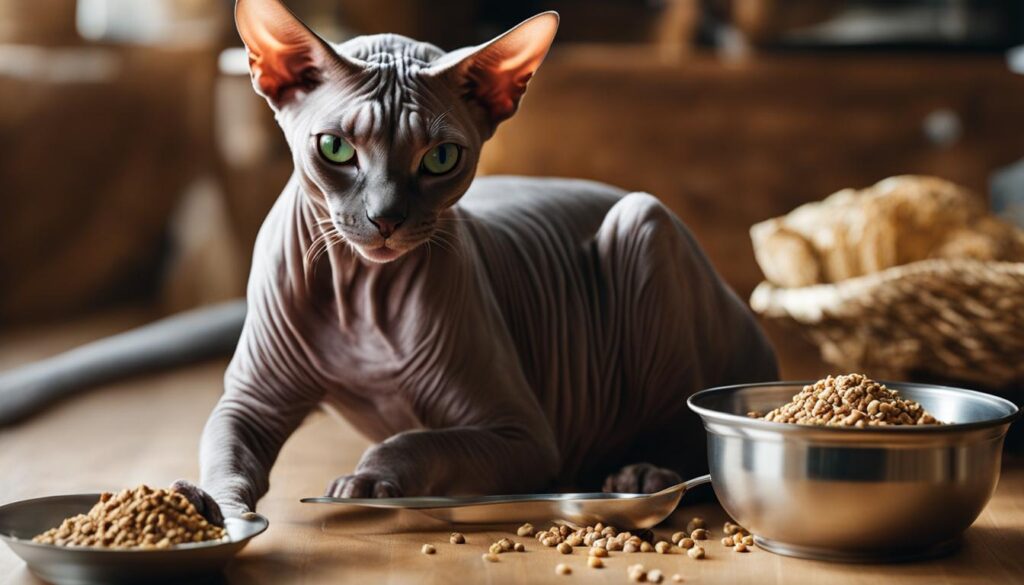
Overall, proper nutrition and diet are essential aspects of Sphynx cat care. By providing them with a healthy and balanced diet, you can help ensure they live a long and happy life.
Creating a Safe and Stimulating Environment for Your Sphynx Cat
As a Sphynx cat owner, it’s essential to create a safe and stimulating environment for your feline companion. Here are some tips and considerations:
Provide Appropriate Toys
Sphynx cats are active and playful, so it’s crucial to offer plenty of toys to keep them entertained. Consider toys that encourage jumping, climbing, and scratching, such as climbing towers or scratching posts. Interactive toys, such as puzzles or toys on strings, can also provide mental stimulation.
Designate Cozy Spots
Sphynx cats crave warmth and comfort, so it’s important to designate cozy spots where they feel safe and secure. Soft blankets or beds near sunny windows or warm radiators can provide the ideal space for your cat to relax and snooze.
Scratching Posts
Sphynx cats need to scratch to keep their claws healthy and to stretch their muscles. Provide several scratching posts or pads in various locations throughout your home to encourage this behavior. Make sure the posts are tall enough for your cat to reach up and stretch, sturdy, and covered in a material your cat likes to scratch.
Keep Them Away from Hazards
As hairless cats, Sphynxes are more sensitive to extreme temperatures, so keep your home at a comfortable temperature year-round. They are also more susceptible to sunlight and sunburn, so keep them in shaded areas or provide them with cat-safe sunscreen if they are spending time outdoors. Additionally, as with any pet, keep hazardous materials such as cleaning supplies and chemicals out of reach.
Offer Elevated Spaces
Sphynx cats love to climb and perch, so offering elevated spaces such as cat trees, shelves, or window perches can provide them with a sense of security and a better view of their surroundings. Make sure these spaces are sturdy and safe, and avoid placing them near windows that your cat may be able to escape from.
“Creating a safe and stimulating environment for your Sphynx cat is crucial to their overall well-being and happiness. Providing appropriate toys, cozy spots, scratching posts, keeping them away from hazards, and offering elevated spaces can all contribute to a fulfilling and comfortable life for your feline companion.
Exercise and Mental Stimulation for Sphynx Cats
Sphynx cats are highly active and need plenty of opportunities to exercise and engage in stimulating activities. Here are some ideas to keep your Sphynx cat physically and mentally healthy:
- Interactive Toys: Sphynx cats love to play, especially with interactive toys that challenge their minds and encourage exercise. Consider toys with bells, feathers, and moving parts that can hold your cat’s interest for extended periods.
- Scratching Posts: Sphynx cats need to scratch to keep their claws healthy and sharp. Provide a sturdy scratching post or pad to keep them from damaging your furniture, and consider placing it near their favorite spots to encourage frequent use.
- Outdoor Enclosures: If you have outdoor space, consider building an enclosed area with plenty of climbing and jumping opportunities for your Sphynx cat to explore safely.
- Training: Sphynx cats are intelligent and can learn a variety of tricks and behaviors with consistent training. Consider teaching them commands such as sit, stay, and come, as well as providing mental stimulation through puzzle toys and games.
Remember that Sphynx cats can overheat easily due to their lack of fur, so be sure to keep them cool and provide plenty of fresh water during playtime. Additionally, always supervise outdoor play and take care to keep your cat safe from potential hazards.
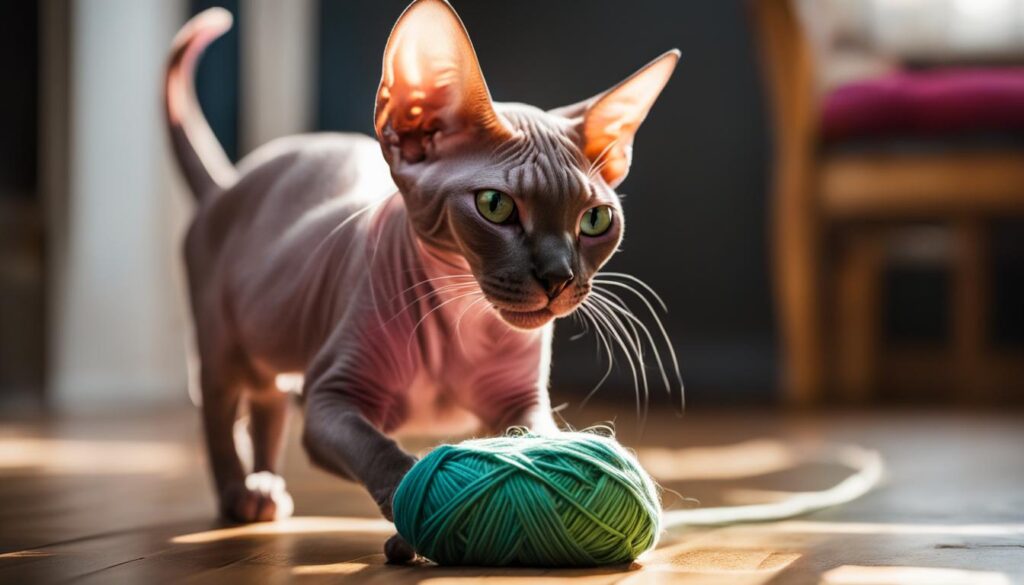
Sphynx Cats and Allergies
As a hairless breed, Sphynx cats are often considered a hypoallergenic cat choice for individuals with cat allergies. While there is no such thing as a completely hypoallergenic cat, Sphynx cats are less likely to cause allergic reactions in people who are sensitive to cat dander.
Unlike other cat breeds that have fur, Sphynx cats do not produce as much of the Fel d 1 protein, which is the allergen that causes most allergic reactions in people. Additionally, their lack of fur means there are fewer opportunities for dander to accumulate and spread throughout the home.
If you have allergies and are considering getting a Sphynx cat, it’s important to spend some time around the breed first to gauge your reaction. While Sphynx cats may be less likely to trigger allergies, it’s still possible to have a reaction.
Tip: Regular grooming and cleaning can also help reduce allergens in your home. Be sure to vacuum frequently, wash bedding in hot water, and use an air purifier to help keep allergens at bay.
Introducing a Sphynx Cat to Your Home
If you’re thinking of adding a Sphynx cat to your family, it’s important to help them acclimate to their new environment. Here are some sphynx cat care tips to ensure a smooth transition:
- Start with a quiet room. When you first bring your Sphynx cat home, give them a quiet room where they can feel safe and get used to their surroundings. Make sure the room is warm and has plenty of comfortable places to rest.
- Introduce them slowly. Once your Sphynx cat has settled into their new room, gradually introduce them to other areas of your home. Start with small increments of time and gradually increase as they become more comfortable.
- Provide plenty of hiding spots. Sphynx cats love to hide and feel safe. Make sure you provide them with plenty of boxes and cozy spots to snuggle up in throughout your home.
- Take it slow with other pets. If you have other pets, it’s important to introduce them slowly and gradually. Make sure to supervise all interactions and provide plenty of positive reinforcement for good behavior.
- Stick to a routine. Sphynx cats love routine, so establish a consistent feeding and playtime schedule. This will help them feel secure and comfortable in their new home.
Remember to be patient and give your Sphynx cat plenty of time to adjust. With the right sphynx cat care, your new companion will feel right at home in no time.
Training and Socializing a Sphynx Cat
As a proud Sphynx cat owner, I can attest to their affectionate nature and social disposition. However, it’s essential to train and socialize them early on to ensure they grow into well-adjusted and loving companions.
One critical aspect of sphynx cat care is establishing basic obedience training. Sphynx cats are intelligent and highly trainable, making them quick learners. Using positive reinforcement techniques, such as treats and praise, can help encourage desirable behaviors.
Another important element of sphynx cat care is socialization. Early exposure to different people, pets, and environments can help them grow into confident and well-rounded cats. Providing appropriate stimulation and playtime can also help prevent behavioral issues, such as excessive scratching or aggression.
To ensure your Sphynx cat receives proper training and socialization, consider enrolling them in a kitten obedience class or working with a professional trainer. They can offer valuable guidance and support to help you and your cat build a strong bond.
Basic Obedience Training Tips for Sphynx Cats
Here are some basic obedience training tips to help you get started:
- Use positive reinforcement techniques, such as treats and praise, to encourage desirable behaviors.
- Start with basic commands, such as “sit,” “stay,” and “come.”
- Practice training sessions regularly, but keep them short and focused.
- Use consistent commands and hand signals to help your cat understand what you want them to do.
- Avoid using punishment or negative reinforcement, which can cause fear and stress for your cat.
Remember, training and socialization are ongoing processes that require patience, consistency, and love. By investing time and effort into sphynx cat care, you can help your furry friend become a cherished and well-behaved member of your family.
Common Health Issues in Sphynx Cats
As with any other pet, Sphynx cats can experience health issues that require prompt attention and treatment. However, due to their hairless nature, they may be more prone to certain conditions than other cats. Here are some common health issues to be aware of when it comes to sphynx cat care:
| Health Issue | Symptoms | Treatment |
|---|---|---|
| Hypertrophic cardiomyopathy | Difficulty breathing, lethargy, coughing, fainting | No cure, but medication can help manage symptoms |
| Dental issues | Bad breath, difficulty eating, swollen gums | Regular dental cleanings and proper oral hygiene |
| Skin conditions | Crusty or flaky skin, rashes, infections | Topical treatments, antibacterial or antifungal medication |
| Heat sensitivity | Excessive panting, restlessness, lethargy | Avoidance of direct sunlight, cooling mats or vests, regular hydration |
It’s important to schedule regular check-ups with a veterinarian who is experienced in sphynx cat care. They can help diagnose and treat any health issues that may arise, as well as provide guidance on proper nutrition and preventive measures to keep your Sphynx cat healthy and happy.
Conclusion
As a professional copywriting journalist, I hope this article has provided you with valuable insights into the world of Sphynx cats. These unique hairless cats are a breed all their own and offer companionship unlike any other. From their hypoallergenic qualities to their distinct appearance, there are many reasons to consider a Sphynx cat as your next furry friend.
However, it’s important to remember that Sphynx cat care is crucial to their overall health and well-being. Proper grooming, skin care, and nutrition are essential for a happy and healthy cat. It’s also important to provide an optimal environment with plenty of opportunities for exercise and mental stimulation.
That being said, Sphynx cats make wonderful companions for those willing to put in the time and effort. Their loving and social nature, combined with their intelligence, make them engaging and interactive pets. Consider adopting a Sphynx cat and discover the unique charm of this extraordinary breed.
FAQ
What makes the Sphynx cat breed unique?
The Sphynx cat breed is known for its hairless appearance, making it stand out from other cat breeds. They are also hypoallergenic, which means they are suitable for individuals with allergies.
How did the hairlessness gene arise in Sphynx cats?
The hairlessness gene in Sphynx cats is a result of natural mutations. It is believed to have originated from a genetic anomaly in domestic cats.
What are the personality traits of Sphynx cats?
Sphynx cats are known for being loving and social creatures. They thrive on human companionship and enjoy interacting with their owners. They are also intelligent and curious, which makes them highly engaging pets.
What are the specific health considerations for Sphynx cats?
Due to their hairless nature, Sphynx cats require extra care when it comes to their skin and grooming. Regular bathing is necessary to keep their skin clean and healthy. Additionally, they are more sensitive to temperature changes and can suffer from sunburn, so it’s important to provide them with appropriate protection and a controlled environment.
What kind of diet should I provide for my Sphynx cat?
It is essential to provide a nutritionally balanced diet for your Sphynx cat. High-quality cat food that meets their specific needs is recommended. Consult with your veterinarian for guidance on the best feeding choices.
How can I create a safe and stimulating environment for my Sphynx cat?
To create an optimal environment for your Sphynx cat, provide them with appropriate toys and scratching posts. It’s also important to create cozy spots where they can feel safe and comfortable. Consider their need for warmth since they lack fur, and ensure they have access to cozy beds or heating pads. Avoid exposing them to extreme temperature fluctuations.
How can I keep my Sphynx cat physically and mentally stimulated?
Sphynx cats require regular exercise to keep them physically and mentally stimulated. Play interactive games with them, provide climbing structures, and engage in interactive toys that promote mental stimulation.
Are Sphynx cats hypoallergenic?
Yes, Sphynx cats are considered hypoallergenic. The lack of fur reduces the amount of allergenic dander they produce. However, it is important to note that individual allergies may vary, and it’s always recommended to spend time with a Sphynx cat before committing to ownership if you have allergies.
How should I introduce a Sphynx cat to my home?
When introducing a Sphynx cat to your home, it’s important to give them time to acclimate to their new surroundings. Allow them to explore at their own pace and provide them with a quiet and comfortable space where they can retreat if they feel overwhelmed.
How can I train and socialize my Sphynx cat?
Start training and socializing your Sphynx cat from an early age. Use positive reinforcement techniques and reward-based training to teach them basic obedience commands. Socialize them with other animals and expose them to different environments to ensure they grow into well-adjusted and sociable companions.
What are some common health issues in Sphynx cats?
Sphynx cats are prone to certain health issues due to their hairless nature. Some common issues include skin allergies, sunburn, and dental problems. Regular veterinary check-ups and proper sphynx cat care can help prevent and manage these health concerns.
References:
Siberian Husky 101: A Comprehensive Guide for First-Time Owners
The Ultimate Tibetan Mastiff Dog: History, Characteristics, and Care Tips (2023-24)
Papillon Dog: Everything You Must Know Before You Own One (2023-24)
Bengal Cats – A Complete Guide to Understanding and Caring for These Magnificent Felines

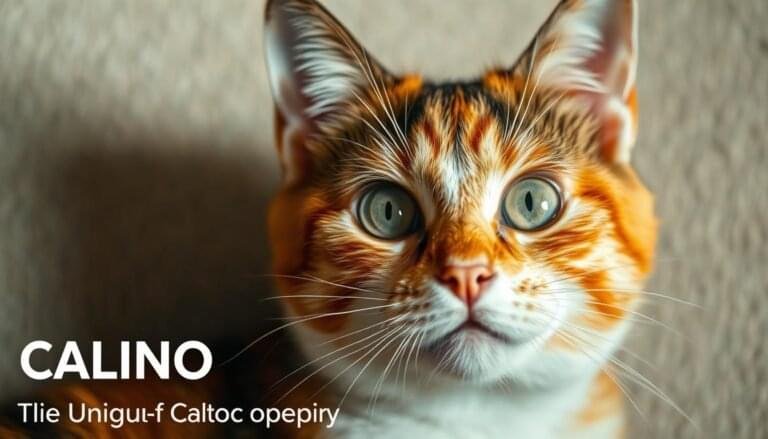
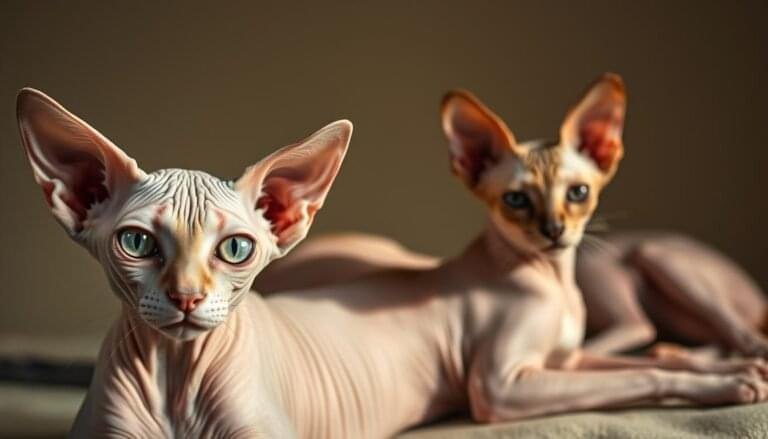
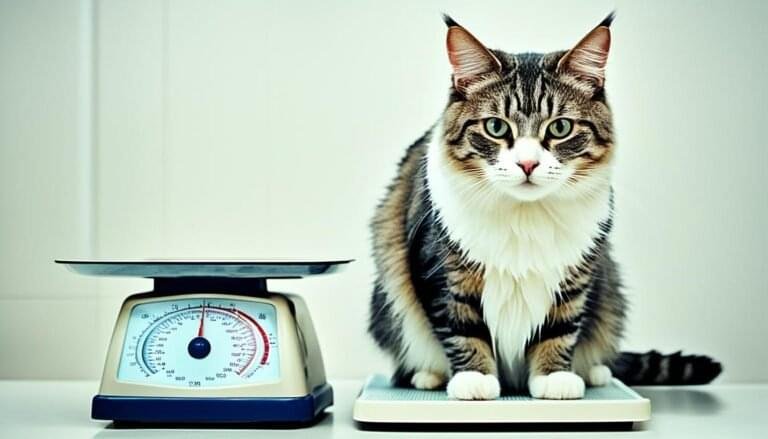




[…] Owning an American Water Spaniel has its pros and cons. Let’s take a closer look at what makes this breed unique. […]
[…] a fascinating history that dates back to post-World War II England. During this time, many domestic cat breeds, including Siamese cats, faced endangerment. To revitalize the Siamese breed, English breeders […]
[…] to prevent unplanned litters. By removing the testicles, neutering eliminates the risk of unwanted breeding and helps control the cat […]
[…] predisposition: While feline hyperthyroidism can affect cats of any breed, there may be a genetic component that makes certain cats more susceptible to the disease. However, […]
[…] Cats have unique sleeping patterns compared to humans. While they do sleep for significant periods during the night, they also have short bursts of intense activity. This is because cats are always on alert even when they are sleeping, which is a result of their natural instincts as hunters. […]
[…] if you’ve ever wondered how many kittens your cat can have, or if you’re considering breeding cats, let’s dive deeper into the fascinating world of cat reproduction and discover what factors […]
[…] A genetic disorder that can cause kidney failure in cats. Testing is available to detect the gene in breeding cats. […]
[…] behavior and strengthen your bond. Let’s delve into the fascinating world of cat tail language and discover the reasons behind this unique form of […]
[…] Sphynx cat is a hairless breed, which means it doesn’t shed as much dander as other cats and may be a good choice for […]
[…] each cat is unique, and they may respond differently to medication administration techniques. Pay attention to their […]
[…] cats act according to their breed and are generally calmer. Looking after them well is key to their happiness later in […]
[…] polydactyly can occur in any cat breed, certain breeds have a higher incidence of polydactyl individuals. Here is a comparison of some cat […]
[…] breeding season for cats can vary depending on geographical location and environmental factors such as temperature and […]
[…] reading to discover the common reasons why cats exhibit open-mouth breathing and how you can ensure your feline companion’s health and […]
[…] from vet care, behavior, and training warn about breeds like Siberian Huskies and terriers. These breeds may not do well with cats because of their urge to chase. Yet, very small to medium-sized dogs, including Cocker Spaniels, […]